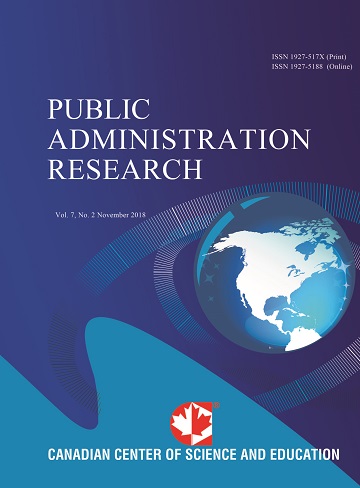Capacity Development and Policies to Reduce Poverty in Latin America
- Cristina Gomes
Abstract
This article aims to analyze some of the government experiences to promote the management capacities of public officials in poverty reduction policies – in particular, the Conditional Cash Transfer Programs (CCTP) of four countries: Brazil, Colombia, Mexico and the Dominican Republic. The methodology includes a bibliographic review and the analysis of government documents such as plans and reports on capacity development for the CCTPs’ officials, and interviews with groups with the managers responsible for the training in each country, performed via Skype or telephone. Based in the bibliography review, the main issues of the capacity development strategy were included in a question guide on the management, objectives, design, contents, implementation, infrastructure, budget and evaluation and of the training programs in each country. Results were analyzed using the content analysis technique, according to the sets of concepts and questions asked in the interviews, and comparing the results between countries. Results show that capacity development in CCTPs varies among countries, according to the level of centralization, available infrastructure and external collaborators. Governments have professionalized the hiring process and the strategy of capacity building of their officials, who have diversified the skills, contents, and the participation of external institutions, partners and collaborators in this process, even focusing in a more culturally sensitive formation, for example, in indigenous languages and participation, as in the Mexican and Colombian cases. However, improvements are necessary in evaluating the results of the training implemented, in order to plan and implement programs based on evidence.
- Full Text:
 PDF
PDF
- DOI:10.5539/par.v8n2p24
Journal Metrics
h-index (2017): 7
i10-index (2017): 6
h5-index (2017): 7
h5-median (2017): 13
Index
- COPAC
- CrossRef
- DTU Library
- EBSCOhost
- EuroPub Database
- Excellence in Research for Australia (ERA)
- Genamics JournalSeek
- Ghent University Library
- Google Scholar
- Harvard Library
- Infotrieve
- Jisc Library Hub Discover
- LOCKSS
- Mir@bel
- Norwegian Centre for Research Data (NSD)
- Open J-Gate
- PKP Open Archives Harvester
- Publons
- ROAD
- Scilit
- SHERPA/RoMEO
- Stanford Libraries
- Ulrich's
- UniCat
- Universe Digital Library
- UoS Library
- WorldCat
Contact
- Gabriel TaiEditorial Assistant
- par@ccsenet.org
